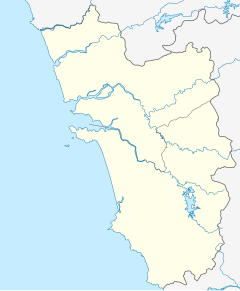Shantadurga Kalangutkarin Temple
This article includes a list of references, related reading or external links, but its sources remain unclear because it lacks inline citations. (February 2021) |
| Shantadurga Kalangutkarin Temple | |
|---|---|
Śāntā durgā | |
 Shantadurga Kalangutkarin Idol(GOA) | |
| Religion | |
| Affiliation | Hinduism |
| Deity | Lord Shiva and Vishnu |
| Location | |
| Location | North Goa |
| State | Goa |
| Country | India |
 Location in Goa | |
| Geographic coordinates | 15°38′05″N 73°55′31″E / 15.6346°N 73.9253°ECoordinates: 15°38′05″N 73°55′31″E / 15.6346°N 73.9253°E |
| Architecture | |
| Completed | 1905 |
| Part of a series on |
| Hinduism |
|---|
 |
|
|
Shri Shantadurga (Kalangutkarin) Devasthan Nanora (शांतादुर्गा ) is a Hindu temple in Nanoda village in Bicholim taluka in Goa. The presiding deity is Shantadurga worshiped in the form of Vishweshwari; normally Shantadurga is worshipped in a Shanta form, but it is believed that after killing the demons the deity's anger was soothed and the Shanta Soumya form of fierce Durga Devi is worshiped in Goa. Shri Shantadurga is goddess of Wealth; prosperity; light; wisdom; fortune; fertility; generosity; courage; beauty;Divine; grace; charisma and charm.
Deity[]
The temple is dedicated to Shantadurga, the Goddess who mediates between Vishnu and Shiva. The deity is also called 'Santeri' colloquially. Local legends tell of a battle between Shiva and Vishnu. The battle was so fierce that Lord Brahma prayed to Parvati to intervene, which she did in the form of Shantadurga. Shantadurga placed Vishnu on her right hand and Shiva on her left hand and settled the fight.
The deity of Shantadurga is shown as holding two serpents, one in each hand, representing Vishnu and Shiva. She is then said have gone to Kalangut, a village in Bardez Taluka, to helping the people in education, prosperity, good health, beauty. As a reward, she was given the name of Rudaya Mohini. She is referred to as the Goddess of Beauty, Wealth, and Prosperity.
History[]
The original temple was located in Calangute near Mapusa City Taluka Bardez. In the 17th century, due to forceful conversion of Hindus by Portuguese invaders, the temple was shifted to Nanora in Bicholim Taluka, where most such temples shifted. Nanora is situated between city Assonora and in South. Mulgaon is famous for temples which were moved[when?] from Salcette ( & ) and Kansarpal in North which is famous for Mahamaya Kalika Devasthan Kasarpal, where as west of Nanora is , which is famous for Kuldevta of Goud Saraswat Brahmins and east of Nanora is the village of Ladfe and the city of Bicholim.
The main priest is from the Bhuskute family (Kokanstha Brahmins).
Iconography[]
The main idol in the sanctum sanctorum is more than 800 years old and is in the form of lingam.
Architecture[]
The modern temple was constructed in the 17th century. It was repaired in the 1990s when the temple was made into a marble masterpiece. The temple has a and agrashalas (guest houses).
Devotees[]
The deity is believed to be patron deity of 96 Kulee Maratha, Kalavants, Bhandari, and Rajapur Saraswat Brahmins community spread all over India. Familiar surnames of the devotees are Sawant, Gad Desai, Naik, Kalangutkar, Kangutkar, Kalgutkar, Karangutkar, Desai, Gawas, Vernekar, etc. The Sawant family are spread in Assagao, Oxelbag, and Mapusa; while Gad Desai are spread in Camurlim, Assagao, Keri, Morjim. The Desai are settled in a small village called Pirna of Desai Wada, Pirna Bardez, Goa.
Festivals[]
- The main festival of the temple is called as Shishirotsav (popularly known as Shigmo). It is a 10-day celebration and includes procession of deities in different with other rituals like kalotsav, Homa, Dhwajarohana, Gulalotsava, Rathotsava, etc.
- Navaratri
- Vasant Panchami
- Akshay Tritiya
- The First Shravani Somvar is Celebrated by Desai of Desai wada, Pirna, Bardez, Goa.
- Dasara
See also[]
- Temples of Goa
- Shri Gaudapadacharya Math
- Kavale
- Mangeshi Village
- Mangueshi Temple
- Shanta Durga Temple
- Kansarpal
- Mahamaya Kalika Devasthan Kasarpal
Gallery[]
Poojari (Krishna Bhuskute),Goa

Shantadurga Temple Interior,Goa
Shantadurga Temple Mahajan,Goa

Shantadurga Temple Exterior,Goa

Shantadurga Temple location,Goa

Holy Mother
External links[]
- Temples of Goa
- Shri Shantadurga Temple, Kavalem
- Shree Shantadurga Devi , Kavlem , Phonda, Goa Official Website
- Photo of Shanta Durga Temple
- Other Durga-Shantadurga Temples
- Navadurga Temples
Other[]
- Shakti temples
- Hindu temples in North Goa district






